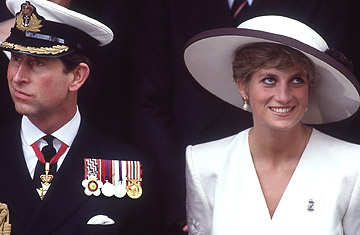
The Prince and Princess of Wales attend the Gulf War Victory Parade at Mansion House in London, June 1991.
The man under questioning called the proceeding a character assassination. And, in a sense, he was right — that was the whole point. On the last day of his testimony at the inquest into the deaths of Princess Diana and Dodi Al Fayed, former butler Paul Burrell was forced to defend his credibility against an army of lawyers intent on, if not destroying it, then at least giving it a good beating. But early on it became clear that this was not going to be the courtroom drama everyone had hoped for. Instead, there was back-pedaling, name-calling and quibbling over semantics — in other words, a whole lot of nothing.
Today it wasn't just Michael Mansfield, lawyer for Dodi's father, Harrods boss Mohamed Al-Fayed, that Burrell had to answer to. Richard Keen — the lawyer for the parents of Henri Paul, the driver who also died in the 1997 crash in Paris — and Ian Croxford, representing the Ritz Hotel, Paris, the starting point for Diana and Dodi's fateful journey, also got in on the act. Questioning him one after the other, they all seemed to be trying to prove the same thing: there are three sides to every story — Paul Burrell's, Paul Burrell's, and the truth. Using his books and articles and transcripts of his earlier testimonies, they spent the morning quoting his own words back to him, pointing out discrepancies between what he had said back then and what he was saying now.
Burrell's biggest about-face had to do with his feelings on Diana's relationship with Dodi. On the first day of his testimony, Burrell had told the court that nobody minded them being a couple, a statement that takes a bite out of Mohamed Al-Fayed's claim that they were assassinated to stop them getting married. But Mansfield opened to a page in Burrell's 2003 book A Royal Duty, and read out a passage that indicated some people did mind — including the former butler himself. In the book, Burrell describes a conversation he once had with Diana's good friend Rosa Monckton about Dodi. "We must do something about this one," Burrell told Monckton. "He is not right for her."
Burrell — exasperated but calm — relented, saying yes, it was true that he had been worried about the Princess entering a relationship so soon after her breakup with heart surgeon Hasnat Khan. Especially since Burrell was convinced she still loved her ex. "I wanted what was best for her," he said. "And I was concerned also for Dr. Hasnat Khan... I was concerned about how he would feel, knowing that he was desperately in love with the Princess and knowing she was desperately in love with him." (Khan has played a starring role in this inquest, but only through the stories of other witnesses; there's no confirmation yet when, or even if, he'll be taking the stand.)
Later, Burrell also told the court that the Queen had her own reservations. In a private meeting with the monarch a few weeks after Diana's death, Burrell said, the Queen admitted to him she thought Diana had been "overexcited" about the romance with Dodi. And when Mansfield asked if Burrell agreed that "the establishment" thought Diana's closeness to the Al-Fayed family was "an alliance made in hell," Burrell said he did. By the end of questioning, it seemed that the only people who didn't mind Diana and Dodi being a couple were Diana and Dodi.
As the game of "he said, he said" continued, Burrell also had to take back a statement he'd made earlier about the "friendship ring" Dodi had given Diana. In A Royal Duty, he wrote that, after a conversation he'd had with Diana about the ring a few days before the crash, he hadn't seen or spoken about it ever again. But, in fact, he had picked up the ring along with Diana's possessions after she died. He had decided not to mention that fact in the book because "I didn't feel I had to at the time." Things got ludicrous when Keen accused Burrell of rewriting history: "Isn't this the sort of thing that got Stalin into trouble?" (Burrell could only shake his head in disbelief, but anyone walking past the court annex would have heard roars of laughter coming from the journalists and inquest-watchers inside.)
By the end, the man who had told the court on his first day that he knew Diana's "every waking thought" was reduced to conceding that "I'm not sure I knew her better than most, but I knew her very well." Still, there's no denying that Burrell knows more stories, secrets and details about Diana than the court could hope to hear in three days. If he knows anything that proves the conspiracy theory surrounding her death, he's not telling. But, then, maybe — just maybe — there's nothing to tell.
